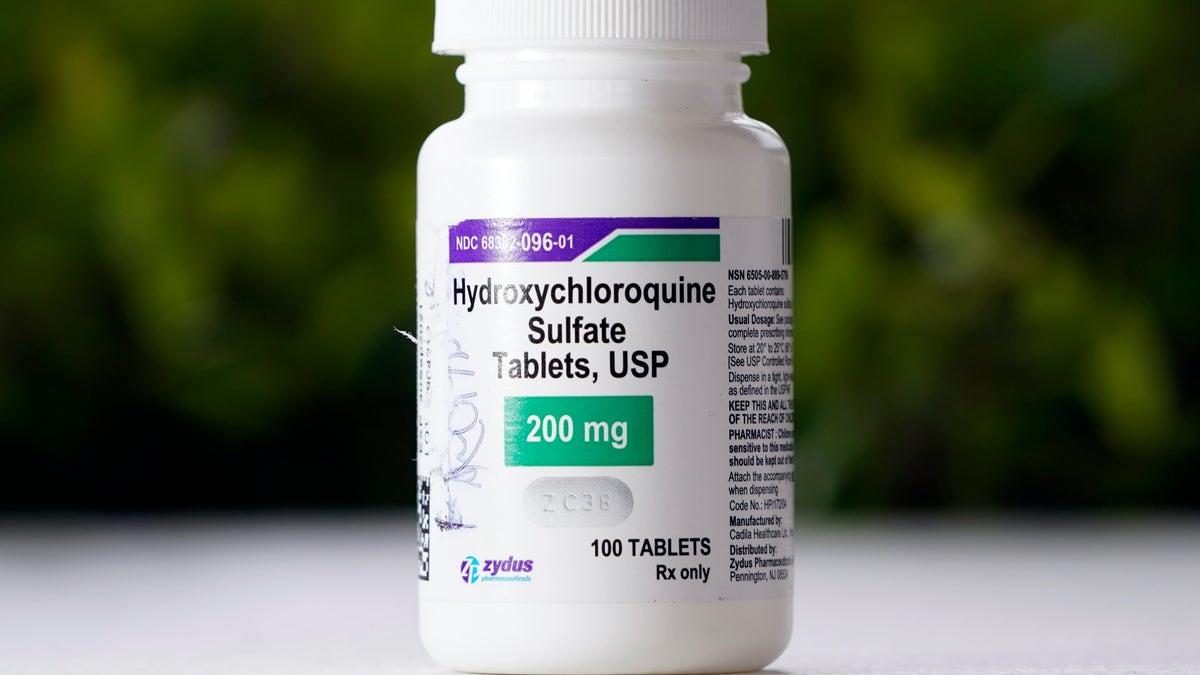
A bottle of hydroxychloroquine is displayed on a table outside The Resort at Texas City nursing home Tuesday, April 7, 2020, in Texas City, Texas. (AP Photo/David J. Phillip)
A Brazilian study testing the antimalarial drug chloroquine for COVID-19 had to be stopped early in one group of patients taking a high dose of the drug, after some patients in this group developed dangerous heart rhythm problems.
Chloroquine and the related drug hydroxychloroquine have made headlines in recent weeks after President Donald Trump called the drugs a potential "game changer" for the treatment of COVID-19.
The Brazilian researchers planned to enroll 440 people in their study to test whether chloroquine is a safe and effective treatment for COVID-19. Participants took either a "high dose" of the drug (600 milligrams twice daily for 10 days) or a "low dose" (450 mg for five days, with a double dose only on the first day). The study was "double blind," meaning that neither the patients nor their doctors knew which dose they were receiving.
However, after enrolling just 81 patients, the researchers saw some concerning signs. Within a few days of starting the treatment, more patients in the high dose group experienced heart rhythm problems than did those in the low dose group. And two patients in the high dose group developed a fast, abnormal heart rate known as ventricular tachychardia before they died.
As a result of the findings, the researchers immediately halted the high-dose arm of the study. They warned against using such high doses for any COVID-19 patients.
"Our study raises enough red flags to stop the use of such [high] dosage … worldwide in order to avoid more unnecessary deaths," the researchers wrote in their paper, posted April 11 to the pre-print database medRxiv. The paper has not yet been published in a peer reviewed journal.
A hospital in France also reportedly stopped treatment of hydroxychloroquine for at least one patient with COVID-19 after the patient developed heart rhythm problems, according to Newsweek.
Chloroquine and hydroxychloroquine have been used for decades as a treatment for malaria, and are generally well-tolerated; but one major complication is the risk of a serious heart rhythm problem called "QT prolongation," the Brazlian authors said. As such, the drugs are not safe for people with heart rhythm problems, or arrhythmia, Live Science previously reported.
"To me, this study conveys one useful piece of information, which is that chloroquine causes a dose-dependent increase in an abnormality in the [electrocardiogram] that could predispose people to sudden cardiac death," Dr. David Juurlink, head of the division of clinical pharmacology at the University of Toronto, who was not involved with the study, told The New York Times.
After the Brazilian researchers halted the high-dose arm, they "unmasked" all patients in this arm and reverted them to the low dose group.
The limited number of patients in the study so far is not enough to determine if the drug has a benefit for COVID-19, but the researchers still plan to enroll patients in the low dose group to complete their study, they said.
All patients in the study also took an antibiotic called azithromycin, which is also known to increase the risk of heart rhythm problems. The researchers note they were not able to assess the toxic effects of this antibiotic by itself since all patients were already using the drug before starting the study. The combination of azithromycin and hydroxychloroquine is also being used in hospitals in the United States, The New York Times reported.
- The 12 deadliest viruses on Earth
- 11 ways processed food is different from real food
- 20 of the worst epidemics and pandemics in history
Originally published on Live Science.
